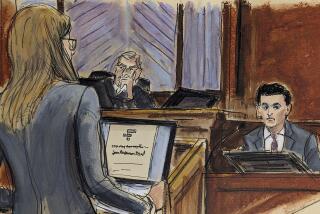Quattrone Took Part in Issuing Shares
- Share via
NEW YORK — Frank Quattrone acknowledged on the witness stand Friday that he was involved in the distribution of some hot stock offerings to clients, a potentially crucial admission that contradicted the hands-off image his defense team has cultivated throughout the two-week criminal trial.
A day after the former Silicon Valley investment banker insisted that he did not decide which investors received shares of initial public stock offerings, government lawyers introduced a series of e-mails indicating that he played a role in the allocation of several IPOs.
During grueling cross-examination that lasted most of the day, federal prosecutor Steven Peikin bore down on Quattrone, asking him at one point whether he was “quite involved” in the IPO allocation process.
Quattrone said he was not, and repeated that he “did not make any decisions” about who would get IPO shares. But he conceded under continued questioning that he may have reviewed lists of proposed IPO recipients and taken part in allocation discussions.
“The allocation process is something you had some participation in?” Peikin asked toward the end of the day.
“From time to time,” Quattrone conceded.
The federal government has charged Quattrone, 47, with two counts of obstruction of justice and one of witness tampering. Prosecutors allege that a December 2000 e-mail Quattrone wrote to his staff at Credit Suisse First Boston encouraging them to destroy documents was an attempt to derail government probes into IPO allocations at CSFB and other firms.
The government was investigating whether CSFB forced clients to pay enormous commissions -- basically kickbacks -- to be awarded shares of coveted stock offerings that offered the potential for immediate profits.
Quattrone’s role in such distributions is pivotal because he has constructed his defense around the argument that IPO allocations were handled by other CSFB departments -- not the technology investment banking unit that he ran -- and that he therefore had no incentive to eradicate documents relating to IPO allocations.
In direct testimony Thursday in U.S. District Court in Manhattan, Quattrone said he had nothing to fear from a grand jury probe of CSFB because “this was about IPO allocations. It was in a different division” of CSFB.
The e-mails introduced Friday painted a different picture.
In one case, the managers of the personal investment fund of Dell Computer Corp. founder Michael Dell asked Quattrone whether he could offer “a little help with our Corvis allocation,” referring to their attempt to secure shares in the July 2000 IPO of technology firm Corvis Corp.
“Just want to let you know I am working the issue,” Quattrone replied.
In an e-mail about two other companies, Quattrone asked a subordinate, “Could we schedule a time to review [quarterly earnings] results and IPO allocations past and future?”
Quattrone’s demeanor on the witness stand Friday was in sharp contrast to a day earlier, when he glided through friendly testimony led by his lawyer, John Keker. Quattrone sat ramrod straight in his chair, and the smile that creased his face Thursday was gone.
The e-mail exchanges with the Dell investment managers and with Dell himself point to another controversial IPO practice known as spinning -- when securities firms give coveted IPO shares to corporate executives in exchange for lucrative investment banking business.
In an e-mail to Quattrone, Michael Dell asked to receive 250,000 shares of the Corvis IPO: “I know there have been efforts on both sides to build the relationship and an offering like this would certainly help,” Dell said.
The e-mail exchanges with Dell also raise troubling questions about the independence and credibility of stock analysts, an issue that -- although unrelated to the charges against Quattrone -- has been at the center of Wall Street’s biggest scandal in the last year.
In one message, Quattrone asks for Dell’s input on an analyst to cover the personal computer industry.
“How would you react to Charlie Wolf?” Quattrone asked.
Dell replied, “You might be better off with a fresh new talent.”
Quattrone faces a maximum of 25 years in prison if he is convicted but probably would receive a much shorter sentence. Quattrone’s cross-examination will continue Tuesday.
More to Read
Inside the business of entertainment
The Wide Shot brings you news, analysis and insights on everything from streaming wars to production — and what it all means for the future.
You may occasionally receive promotional content from the Los Angeles Times.










